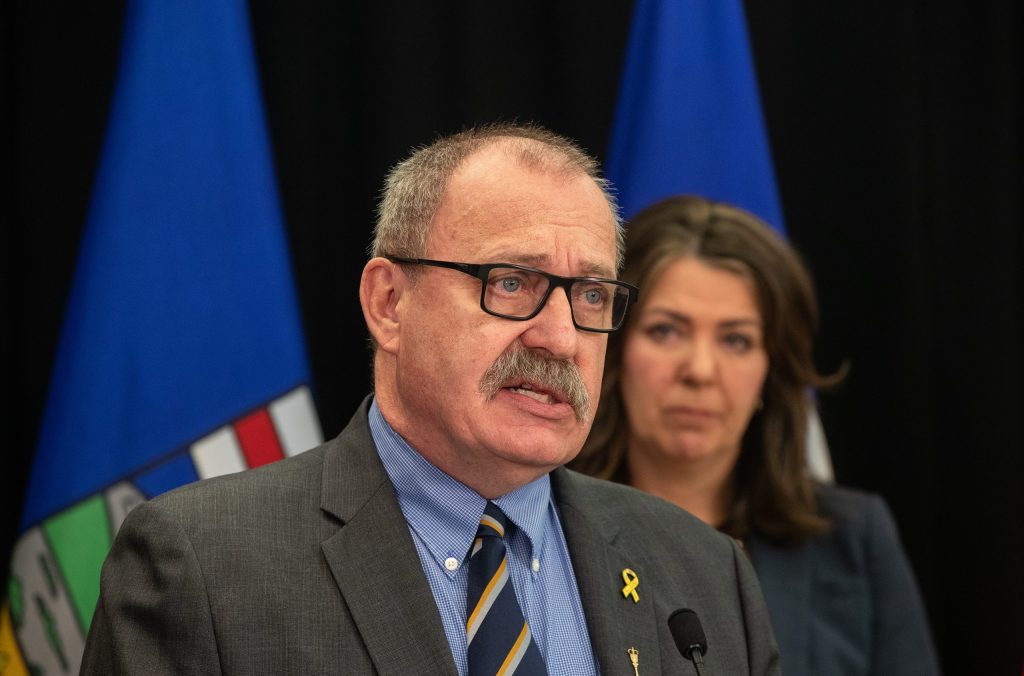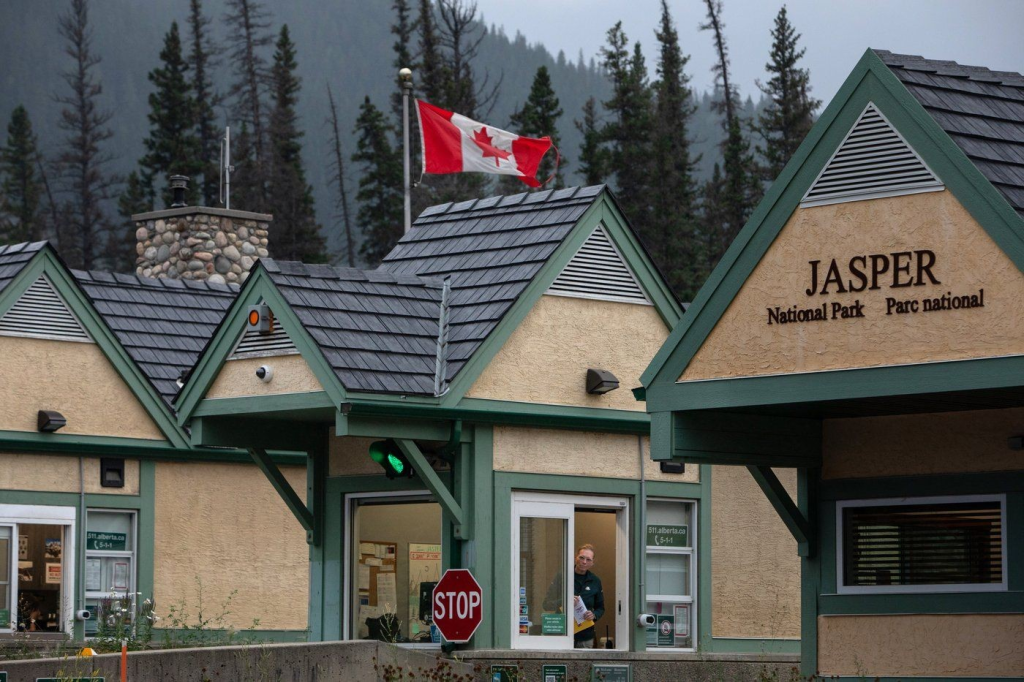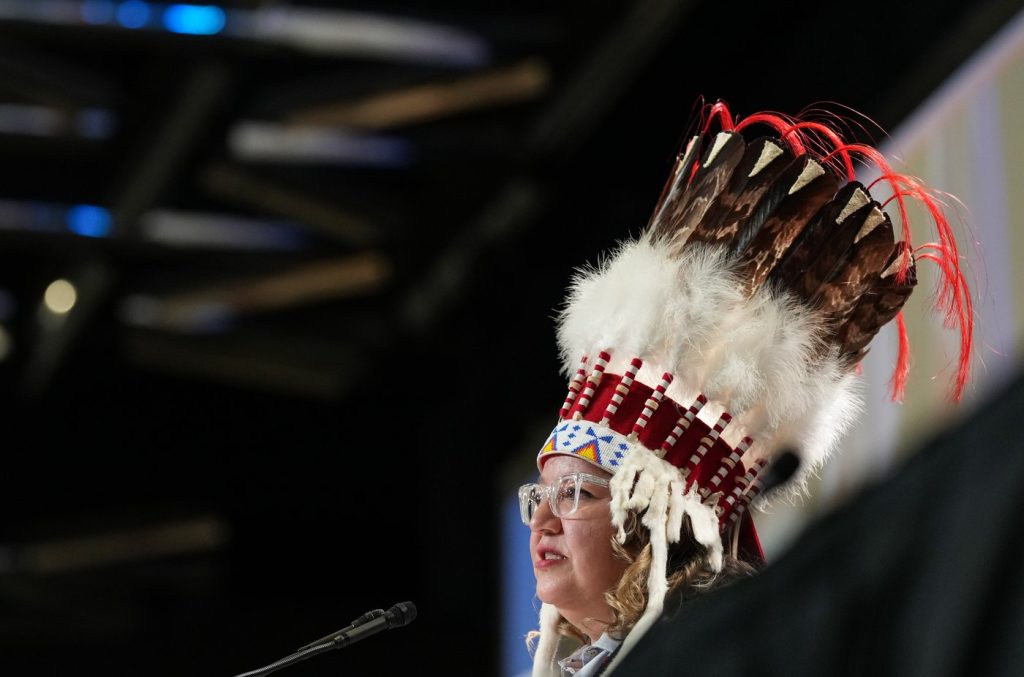updated
Alberta legislation that bans voting tabulators, allows municipal political parties, to be law by end of October

Posted October 18, 2024 8:08 am.
Last Updated October 18, 2024 12:20 pm.
More details will be released Friday on Alberta’s Bill 20, which is set to give the provincial government sweeping powers over municipalities.
The Municipal Affairs Statutes Amendment Act 2024, was passed at the end of the spring legislature sitting in May, and makes it easier for the province to overrule local bylaws, start a recall of councillors and mayors, and pave the way for political parties in Calgary and Edmonton.
Bill 20 makes changes to the Local Authorities Election Act and the Municipal Government Act which the province says will add greater transparency to local election processes and require greater accountability from local councils and elected officials.
Critics have previously called it an undemocratic power grab.
Alberta Municipalities, in particular, has called for the bill to be scrapped due to a lack of consultation.
Local Authorities Election Act
The Act establishes rules for election in Alberta municipalities, school divisions, irrigation districts, and Metis Settlements.
There are several changes being made to the LAEA including allowing the creation of local political parties and outlining their expense limits, expanding the use of special ballots in local elections, banning electronic voting equipment like tabulators, clarifying the rules and processes for scrutineers, and allowing municipalities to require criminal record checks for local candidates.
Amendments to the LAEA under Bill 20 include:
- The ability of unions and corporations to donate $5,000 per municipality per year, the same as individuals. Donations can be made outside of the election year and annual reporting on monetary contributions will be required.
- Third party advertisers campaigning for or against an issue on a ballot, like a plebiscite, must register and report their finances. Third=party advertisers also have a $5,000 donation limit per election period, which starts on May 1 of the election year.
- Municipalities will no longer be able to create a voters list based on enumeration. Previously, municipalities could make a voters list, which has to be shared with all candidates.
- Municipalities will be required to make a permanent electors register, in partnership with Elections Alberta use data from the provincial register of electors.
- Vouching will be limited to someone’s address, rather than their address, age, and identity.
- Scrutineers and candidate’s official agents will no longer be able to object to an elector. Before this legislation, scrutineers could object to a voter, but they could still cast a ballot.
- Elections can be postponed in emergencies, such as a wildfire, by the minister.
- Automated voting equipment, such as electronic tabulators, are banned.
- Recounts will be required if the runner-up candidate requests, but the margin must be within 0.5 per cent of total votes.
Rules for Local Political Parties (LPPs) and Slates
LPPs and slates of candidate will be allowed in Calgary and Edmonton beginning in the October 2025 election.
Registered LPPs and slates will submit a list of endorsed candidates, and the party name will appear next to the candidates’ names on the ballot.
To register a Local Political Party, applications must have names, addresses, and signatures of 1,000 people who are eligible to vote in an election in that municipality and are members of the LPP and support the party’s registration. The application must also have a list of candidates who have committed to run as endorsed candidates under the party and who, if elected, would make up at least one-third of the total council.
For example, there are 14 wards in Calgary, so a LAPP would have to run at least five candidates.
LPPs and slates can’t be affiliated with any provincial or federal political party and won’t be successfully register if its proposed name or abbreviation resembles the name of an existing party at the provincial, federal, or local level.
Provincial and federal political parties are also not allow to donate to LPPs.
Local political parties are not allowed for school board trustee elections.
Amendments to the Municipal Government Act (MGA) under Bill 20 include:
- A councillor’s seat must become vacant if they are disqualified for a specific reason. In the past, municipal councils or voters could only remove a disqualified councillor through the courts if they refuse to leave their seat.
- Councillors will be required to undertake mandatory orientation training.
- The province can order a vote of the electors to determine whether a councillor should be removed. However, the decision to launch a vote to remove a councillor is limited to councillors Cabinet considers to be unwilling, unable, or refusing to the job they were elected to do, or if the province considers vote to be in the public interest by taking into consideration illegal or unethical behaviour by a councillor.
- Allow elected officials to recuse themselves for real or perceived conflicts of interest, rather than just a financial interest.
- The Minister of Municipal Affairs would be responsible for validating municipal recall petitions, rather than the municipality’s Chief Administrative Officer (CAO).
- The province will be able to require a municipality to repeal or amend a bylaw under specific requirements, like if it exceeds the scope of the MGA, or oversteps the authority given to municipalities under the MGA, conflicts with the MGA or is deemed to go against provincial or federal policy.
- The province will be able to direct a municipality to take specific action to protect public health and/or safety.
Changes are also being made related to housing development under the Municipal Government Act.
There will be a requirement for municipalities to offer electronic options for public hearings on planning and development. Municipalities will also not be able to hold extra public hearings when not required by law.
Non-profit and affordable housing will be fully exempt from property taxes, and municipalities will be able to introduce multi-year residential property tax incentives.
Financial regulations
Financial rules for local political parties are similar to those for local candidates — contributions to a LPP can only be made by Alberta residents and organizations, including unions and corporations.
The maximum contribution allowed is $5,000 in the aggregate to all registered local political parties per municipality, per year.
Candidates on slates are not allowed to accept financial contributions and don’t have expense limits as their campaign costs are shared equally by each member and applied to individual expense limits.
During an election year, mayoral candidates can spend up to $1 per person based on the population of the municipality, or $20,000, whichever is higher.
Similarly for councillor candidates, the limit will be up to $1 per person based on the average population of the wards in the municipality or $20,000, whichever is greater. In municipalities where there are no wards, the limit is $1 per person based on the municipality’s population, or $20,000, which ever is higher.
Local political parties will be allowed to spend $1 per person based on the average population of all wards in the municipality, for each ward where the party has endorsed candidates running.
Third-party advertisers will be allowed to spend $0.50 per person based on the population or the municipality during the election year advertising period, which is May 1 to Oct. 20, 2025.
In the year before an election, all candidates will be allowed to spend $0.50 per person based on population or the average population of the wards, or $10,000, whichever is higher.
LPPs will be able to spend up to $0.50 per person based on the average population of all wards in the municipality, for all wards where the party has candidates.
In what is being called a “cooling-off period” candidates and local political parties won’t be able to incur expenses in the two years following the election.
LPPs and slates must register with the returning officer before accepting money or incurring expenses. They also have to submit annual financial disclosure for each year the party accepts contributions or incurs expenses.
There are fines for not filing annual disclosures, or for taking illegal donations. However, the minister says those penalties are being reviewed to determine if they are adequate.
Critics have previously called it an undemocratic power grab.
Alberta Municipalities, in particular, has called for the bill to be scrapped due to a lack of consultation.
Criticism from municipalities
Following the announcement Friday, Alberta Municipalities, which services 265 of Alberta’s 334 municipalities, said the new regulations create an uneven playing field for candidates as well as a more expensive electoral process,
“Albertans have repeatedly said they want less money, not more, in local politics. They have also said they do not want political parties in local elections. These regulations give more money to political parties and their candidates,” the organization said. “While we acknowledge the regulation on political parties in municipal elections currently applies to only two municipalities, Calgary and Edmonton, we are concerned that they will be extended to other municipalities in Alberta in the years ahead.”
It adds that during consultation with the province, it raised concerns about candidates who choose not to list a LPP beside their name being left at a disadvantage.
Alberta Municipalities also expressed concern about the banning of electronic voting tabulators which it says “will compound unwelcome expenses, complexity and potential delays to election results due to the requirement to count ballots by hand.”
It is asked the province to reconsider this legislation.
Municipal Affairs Minister, Ric McIver cited a May Leger report during his Friday remarks, which indicated 37 per cent of Albertans are in favour of banning tabulators.
The province has been accused of catering to the minority on this issue, and perpetuating a conspiracy theory popular among Trump Republicans in the U.S.
On the anticipated significant increase to overall election cost, McIver said municipalities have always paid to run their own elections and that will not be changing.
The legislation and its related legislation is expected to come into effect on Oct. 31.
The next municipal election is set for Oct. 20, 2025. Nominations open on Jan. 1, 2025 and close Sept. 23, 2025.
-With files from Michael Ranger








